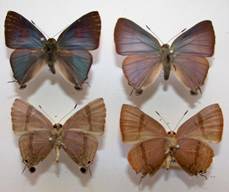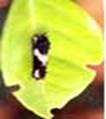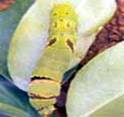Fruit borer, Deudorix isocrates
| Symptoms of damage |
- Caterpillar bores into young fruits
- Feeds on internal contents (pulp and seeds)
- Fruit rotting and dropping
|
| Identification of pest |
- Larvae - dark brown, short and stout, covered with short hairs
- Adult - bluish brown butterfly
- Female – V shaped patch on forewing
|
 |
| Adult |
|
| Management |
- Collect and destroy damaged fruits
- Clean cultivation as weed plants serve as alternate hosts
- Endemic areas - grow less susceptible varieties
- Adopt ETL (5 eggs/plant)
- Cover the fruit with polythene bags when the fruits are up to 5 cm
- Use light trap @ 1/ ha to monitor the activity of adults
- Insecticides: malathion 50 EC 0.1% or two rounds, one at flower formation and next at fruit set.
- Flowering stage - spray NSKE 5% or neem formulations 2 ml/1
- Apply dimethoate 30 EC 1.5 ml/1.
- Release Trichogramma chilonis at one lakh/acre.
|
Citrus butterfly, Papilio demolious
| Symptoms of damage |
- Caterpillar feed on the leaves
- Defoliation
|
| Identification of pest |
- Larvae
- Early stage larva resembles bird dropping
- Grown up larva – cylindrical, stout, green and brown lateral bond
- Adult - Dark brown swallowtail butterfly with numerous yellow marking
|
 |
 |
 |
| Young larva |
Grown up larva |
Adult |
|
| Management |
- Hand pick the larvae and destroy
- Early stage - spraying of 1.5ml monocrotophos or 2 ml of methyl parathion per litre of water
- Field release of parasitoids Trichogramme evanescens and Telenomus sp on eggs
Brachymeria sp on larvae and Pterolus sp. on Pupae
|
|

